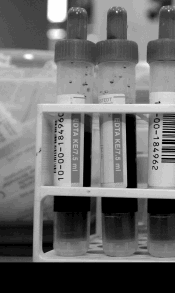A Blood Test For Migraine?
What if you could have a simple blood test done which could confirm your diagnosis of migraine – and also put you on the road to proper treatment?
True, scientific, individualized treatment is something we’ve been promised for years – but still there’s no good genetic test or blood test or any other kind of test that can diagnose migraine every time and tell you which treatment will be the most effective.
 |
But that’s not to say that blood tests (or other types of tests) are useless. As a matter of fact, there is a blood test that may help some migraine patients discover an important treatment for them. And it’s not only helpful for migraine patients, but for those with depression – and often one patient is dealing with both issues.
And there’s more.
If this test comes up positive, it may also warn you of a higher risk of stroke and heart disease. Sound familiar? Yes, migraine patients (at least some) do seem to have a higher risk of stroke and heart disease.
Now, we’re talking about a simple test that can help you treat migraine, depression, and your risk of heart disease. I should ask those of you with migraine – or migraine and depression – have you ever heard of such a thing? Have you had a blood test done? Some of you I hope will be saying yes. Others of you are wondering why no doctor has sent you for blood work before.
And that would be a good question.
What is the test? It’s a homocysteine test.
Homocysteine is an amino acid that converts into another amino acid known as cysteine. If it’s not converting properly, homocysteine levels rise – and those high levels are linked to the heart disease and to depression.
There’s a link to migraine as well. Those who suffer from migraine with aura in particular seem more likely to have high homocysteine levels. (See The relationship between homocysteine and genes of folate-related enzymes in migraine patients)
In studies of both men and women, high levels were associated with depression, and in many cases lowering homocysteine levels helped to treat the depression significantly. It has been hypothesized that the high levels caused vascular disease and neurotransmitter deficiency, which in turn had an impact on mood. (See The homocysteine hypothesis of depression.)
So just how to all these things fit together? Research is still being done to understand the connection. But there is a connection.
Before we go any further, let’s be clear. We’re not saying homocysteine is a cause of migraine (it could be a trigger, or a result), and we’re not saying that everyone with depression or migraine has high homocysteine levels. And not everyone with high levels is depressed or has migraine disease.
But here’s the problem. It’s very likely that many people suffering from migraine and depression could be helped by dealing with this problem – a problem detected by a simple blood test. But the blood work has never been done. Instead, they’re on two or three medications.
Solving the Problem
So what do you do for high homocysteine levels?
This blood test often goes together with other tests, checking levels of folate, vitamins B12 and B6, and zinc. You see, these vitamins and minerals help with the conversion of homocysteine into cysteine. High homocysteine levels can be an early detector of deficiency.
A proper checkup needs to go along with the blood test – it’s not just a matter of checking the numbers. For example, Dr. Alexander Mauskop of the New York Headache Clinic points out that you could have high levels of B12 and yet still have deficiency – due to problems with the transport of B12 into the blood cells. (See Homocysteine and migraine)
The solution is to make sure proper levels of folate (what folic acid or B9 is in your body), vitamins B12 and B6, and zinc are getting where they need to go in your body.
That doesn’t mean taking a B complex vitamin. It usually means taking higher amounts of folic acid (B9) and B12 than you would find in that B complex pill from the drugstore. And it may mean taking a sublingual version, or an injection. B12 sublingual tablets like these have helped some people.
A good doctor will also help you look at your diet, which could be contributing to the deficiency, and lifestyle issues such as smoking.
The point is, once you are aware of a deficiency, the treatment will very much depend on your individual case, because a number of things can cause the high homocysteine levels. Patients who have tried taking certain vitamins and think it "didn’t work" may need a more complete check-up by a migraine specialist. A different series of vitamins, or different types, or a change in medication may be required to solve the problem.
Though it may not help everyone, this simple test will probably get many on the road to a better treatment. Isn’t it worth talking to your doctor about?
For more, read Can a Simple Blood Test Solve Depression? and Homocysteine and migraine
